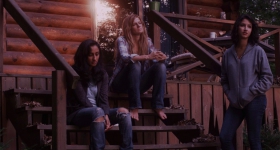In Dust of Life, first-time director Le-Van Kiet portrays the conflicted and sometimes violent lives of Vietnamese American youth living in Orange County during the early ’90s. The film follows the life of Johnny, an orphaned and displaced teenage refugee dealing with issues of assimilation and gang life.
Can you explain the title and how it applies to Vietnamese American youth?
Dust of life, “Bui Doi” in Vietnamese, refers to street kids in Vietnam who had to fight and beg for food. For me, the phrase defines a lost generation with a struggle for identity and the stigma of being displaced. I feel this summarizes the psychology of Vietnamese American youths.
Your film opens with a shot of the “boat people.” Why did you choose this image to begin your film?
It’s really to remind the audience of where these kids are coming from. The Vietnamese community is still in various stages of healing and understanding because of their history and this needs to be recognized.
What is the story behind the production of your film?
When I was in film school at UCLA, I knew I wanted to tell this story, not only for myself but for the community. I went to my own experiences growing up in Orange County in the late ’80s and early ’90s. I also talked with many gang members and former gang members, and talked with their friends and family. The film is a collection of these experiences.
Many of your actors are first timers. Was this beneficial for the film and its realism?
Yes, it was a conscious decision on our part to cast non-actors. We did take a risk because some of these kids had never been exposed to a film set. But I think the risk was worth it because the authenticity that showed on screen was wonderful.
Have you had any negative backlash from the Vietnamese American community?
Surprisingly, no. It was something that was always on my mind when writing the script. However, I didn’t find myself compromising because, in a sense, it wasn’t me writing the script, it was the voice of the characters who were dictating the story. I think the community knows how real the violence is because they had to experience it themselves. —Jason Coe









Comments